回家,第13届韩素音翻译大赛参考译文∣文学翻译
- 格式:docx
- 大小:88.21 KB
- 文档页数:4
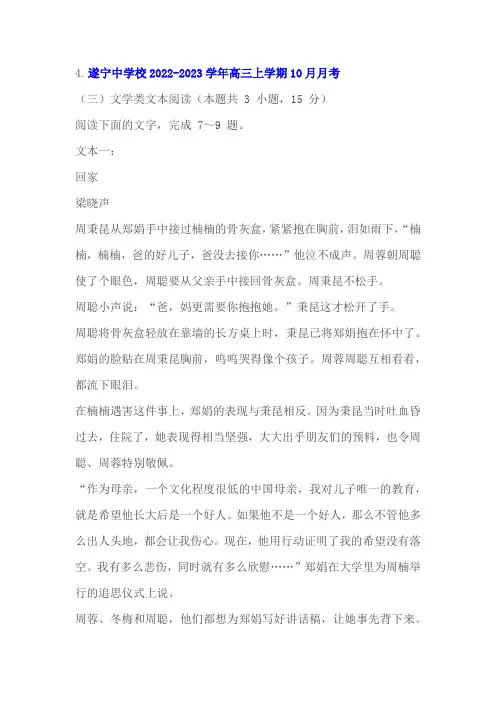
4.遂宁中学校2022-2023学年高三上学期10月月考(三)文学类文本阅读(本题共 3 小题,15 分)阅读下面的文字,完成 7~9 题。
文本一:回家梁晓声周秉昆从郑娟手中接过楠楠的骨灰盒,紧紧抱在胸前,泪如雨下,“楠楠,楠楠,爸的好儿子,爸没去接你……”他泣不成声。
周蓉朝周聪使了个眼色,周聪要从父亲手中接回骨灰盒。
周秉昆不松手。
周聪小声说:“爸,妈更需要你抱抱她。
”秉昆这才松开了手。
周聪将骨灰盒轻放在靠墙的长方桌上时,秉昆已将郑娟抱在怀中了。
郑娟的脸贴在周秉昆胸前,呜呜哭得像个孩子。
周蓉周聪互相看看,都流下眼泪。
在楠楠遇害这件事上,郑娟的表现与秉昆相反。
因为秉昆当时吐血昏过去,住院了,她表现得相当坚强,大大出乎朋友们的预料,也令周聪、周蓉特别敬佩。
“作为母亲,一个文化程度很低的中国母亲,我对儿子唯一的教育,就是希望他长大后是一个好人。
如果他不是一个好人,那么不管他多么出人头地,都会让我伤心。
现在,他用行动证明了我的希望没有落空。
我有多么悲伤,同时就有多么欣慰……”郑娟在大学里为周楠举行的追思仪式上说。
周蓉、冬梅和周聪,他们都想为郑娟写好讲话稿,让她事先背下来。
郑娟问:“需要我说很多吗?”亲人们说不用,又不是演讲,几句就行。
如果她实在不想说什么,其他亲人也可以代替讲话。
郑娟说:“我想说,话多了我说不好,就几句话我还是说得来的。
”周聪说:“妈,你如果想好了说什么,最好先说给我们听听。
”郑娟却说:“不用,妈又不是小孩子。
”郑娟在台上讲话时,只流泪,没有哭,甚至都没抽泣一声。
周蓉为她做翻译。
她刚说了前两句,周蓉便猜到她接下来会怎么说。
她的样子那么镇定,那么从容不迫,亲人们完全放心了。
周蓉的英语口译水平是一流的,表现也无可挑剔。
参加追思仪式的师生们为她们鼓掌,那是不同寻常的,人们情不自禁地为她们的真诚破例了。
事后,有电视台和报社记者要采访。
他们对周蓉郑娟姑嫂二人很有兴趣,两人中,一个是举止优雅、学养深厚的学者,而另一个是粗服乱头、笨拙淳朴的家庭主妇。
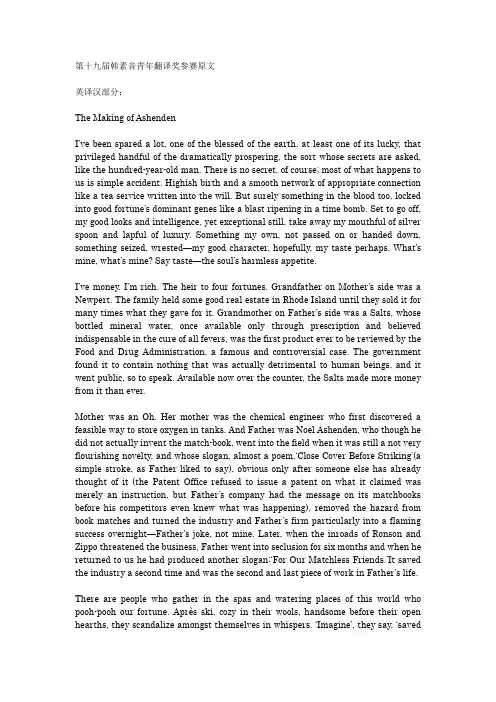
第十九届韩素音青年翻译奖参赛原文英译汉部分:The Making of AshendenI’ve been spared a lot, one of the blessed of the earth, at least one of its lucky, that privileged handful of the dramatically prospering, the sort whose secrets are asked, like the hundred-year-old man. There is no secret, of course; most of what happens to us is simple accident. Highish birth and a smooth network of appropriate connection like a tea service written into the will. But surely something in the blood too, locked into good fortune’s dominant genes like a blast ripening in a time bomb. Set to go off, my good looks and intelligence, yet exceptional still, take away my mouthful of silver spoon and lapful of luxury. Something my own, not passed on or handed down, something seized, wrested—my good character, hopefully, my taste perhaps. What’s mine, what’s mine? Say taste—the soul’s harmless appetite.I’ve money, I’m rich. The heir to four fortunes. Grandfather on Mother’s side was a Newpert. The family held some good real estate in Rhode Island until they sold it for many times what they gave for it. Grandmother on Father’s side was a Salts, whose bottled mineral water, once available only through prescription and believed indispensable in the cure of all fevers, was the first product ever to be reviewed by the Food and Drug Administration, a famous and controversial case. The government found it to contain nothing that was actually detrimental to human beings, and it went public, so to speak. Available now over the counter, the Salts made more money from it than ever.Mother was an Oh. Her mother was the chemical engineer who first discovered a feasible way to store oxygen in tanks. And Father was Noel Ashenden, who though he did not actually invent the match-book, went into the field when it was still a not very flourishing novelty, and whose slogan, almost a poem,‘Close Cover Before Striking’(a simple stroke, as Father liked to say), obvious only after someone else has already thought of it (the Patent Office refused to issue a patent on what it claimed was merely an instruction, but Father’s company had the message on its matchbooks before his competitors even knew what was happening), removed the hazard from book matches and turned the industry and Father’s firm particularly into a flaming success overnight—Father’s joke, not mine. Later, when the inroads of Ronson and Zippo threatened the business, Father went into seclusion for six months and when he returned to us he had produced another slogan:‘For Our Matchless Friends.’It saved the industry a second time and was the second and last piece of work in Father’s life.There are people who gather in the spas and watering places of this world who pooh-pooh our fortune. Après ski, cozy in their wools, handsome before their open hearths, they scandal ize amongst themselves in whispers. ‘Imagine’, they say, ‘savedfrom ruin because of some cornball sentiment available in every bar and grill and truck stop in the country. It’s not, not...’Not what? Snobs! Phooey on the First Families. On railroad, steel mill, automotive, public utility, banking and shipping fortunes, on all hermetic legacy, morganatic and blockbuster blood-lines that change the maps and landscapes and alter the mobility patterns, your jungle wheeling and downtown dealing a stone’s throw from warfare. I come of good stock—real estate, mineral water, oxygen, matchbooks: earth, water, air and fire, the old elementals of the material universe, a bellybutton economics, a linchpin one.It is as I see it a perfect genealogy, and if I can be bought and sold a hundred times over by a thousand men in this country—people in your own town could do it, providents and trailers of hunch, I bless them, who got into this or went into that when it was eight cents a share—I am satisfied with my thirteen or fourteen million. Wealth is not after all the point. The genealogy is. That bridge-trick nexus that brought Newpert to Oh, Salts to Ashenden and Ashenden to Oh, love’s lucky longshots which, paying off, permitted me as they permit every human life! (I have this simple, harmless paranoia of the good-natured man, this cheerful awe.) Forgive my enthusiasm, that I go on like some secular patriot wrapped in the simple flag of self, a professional descendant, every day the closed-for-the-holiday banks and post offices of the heart. And why not? Aren’t my circumstances superb? Whose are better? No boast, no boast. I’ve had it easy, served up on all life’s silver platters like a satrap. And if my money is managed for me and I do no work—less work even than Father, who at least came up with those two slogans, the latter in a six-month solitude that must have been hell for that gregarious man (‘For Our Matchless Friends’: no slogan finally but a broken code, an extension of his own hospitable being, simply the Promethean gift of fire to a guest)—at least I am not ‘spoiled’ and have in me still alive the nerve endings of gratitude. If it’s miserly to count one’s blessings, Brewster Ashenden’s a miser.This will give you some idea of what I’m like:On Having an Account in a Swiss Bank: I never had one, and suggest you stay away from them too. Oh, the mystery and romance is all very well, but never forget that your Swiss bank offers no premiums, whereas for opening a savings account for 5,000 or more at First National City Bank of New York or other fine institutions you get wonderful premiums—picnic hampers, Scotch coolers, Polaroid cameras, Hudson’s Bay blankets from L. L. Bean, electric shavers, even lawn furniture. My managers always leave me a million or so to play wi th, and this is how I do it. I suppose I’ve received hundreds of such bonuses. Usually I give them to friends or as gifts at Christmas to doormen and other loosely connected personnel of the household, but often I keep them and use them myself. I’m not sti ngy. Of course I can afford to buy any of these things — and I do, I enjoy making purchases — but somehow nothing brings the joy of existence home to me more than these premiums. Something fromnothing — the two-suiter from Chase Manhattan and my own existence, luggage a bonus and life a bonus too. Like having a film star next to you on your flight from the Coast. There are treats of high order, adventure like cash in the street.Let’s enjoy ourselves, I say; let’s have fun. Lord, let us live in the sand b y the surf of the sea and play till cows come home. We’ll have a house on the Vineyard and a brownstone in the Seventies and a pied-à-terre in a world capital when something big is about to break. (Put the Cardinal in the back bedroom where the sun gilds the bay at afternoon tea and give us the courage to stand up to secret police at the door, to top all threats with threats of our own, the nicknames of mayors and ministers, the fast comeback at the front stairs, authority on us like the funny squiggle the counterfeiters miss.) Re-Columbus us. Engage us with the overlooked, a knowledge of optics, say, or a gift for the tides. (My pal, the heir to most of the vegetables in inland Nebraska, has become a superb amateur oceanographer. The marine studies people i nvite him to Wood’s Hole each year. He has a wave named for him.) Make us good at things, the countertenor and the German language, and teach us to be as easy in our amateur standing as the best man at a roommate’s wedding. Give us hard tummies behind the cummerbund and long swimmer’s muscles under the hound’s tooth so that we may enjoy our long life. And may all our stocks rise to the occasion of our best possibilities, and our humanness be bullish too.Speaking personally I am glad to be a heroic man.I am pleased that I am attractive to women but grateful I’m no bounder. Though I’m touched when married women fall in love with me, as frequently they do, I am rarely to blame. I never encourage these fits and do my best to get them over their derangements so as not to lose the friendships of their husbands when they are known to me, or the neutral friendship of the ladies themselves. This happens less than you might think, however, for whenever I am a houseguest of a married friend I usually make it a point to bring along a girl. These girls are from all walks of life—models, show girls, starlets, actresses, tennis professionals, singers, heiresses and the daughters of the diplomats of most of the nations of the free world. All walks. They tend, however, to conform to a single physical type, and are almost always tall, tan, slender and blond, the girl from Ipanema as a wag friend of mine has it. They are always sensitive and intelligent and good at sailing and the Australian crawl. They are never blemished in any way, for even something like a tiny beauty mark on the inside of a thigh or above the shoulder blade is enough to put me off, and their breaths must be as sweet at three in the morning as they are at noon. (I never see a woman who is dieting for diet sours the breath.) Arm hair, of course, is repellent to me though a soft blond down is now and then acceptable. I know I sound a prig. I’m not. I am—well, classical, drawn by perfection as to some magnetic, Platonic pole, idealism and beauty’s true North.。
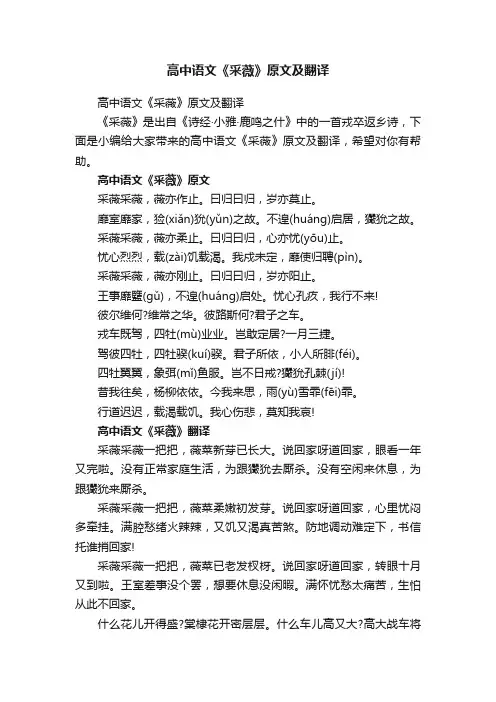
高中语文《采薇》原文及翻译高中语文《采薇》原文及翻译《采薇》是出自《诗经·小雅·鹿鸣之什》中的一首戎卒返乡诗,下面是小编给大家带来的高中语文《采薇》原文及翻译,希望对你有帮助。
高中语文《采薇》原文采薇采薇,薇亦作止。
曰归曰归,岁亦莫止。
靡室靡家,猃(xiǎn)狁(yǔn)之故。
不遑(huáng)启居,玁狁之故。
采薇采薇,薇亦柔止。
曰归曰归,心亦忧(yōu)止。
忧心烈烈,载(zài)饥载渴。
我戍未定,靡使归聘(pìn)。
采薇采薇,薇亦刚止。
曰归曰归,岁亦阳止。
王事靡盬(gǔ),不遑(huáng)启处。
忧心孔疚,我行不来!彼尔维何?维常之华。
彼路斯何?君子之车。
戎车既驾,四牡(mù)业业。
岂敢定居?一月三捷。
驾彼四牡,四牡骙(kuí)骙。
君子所依,小人所腓(féi)。
四牡翼翼,象弭(mǐ)鱼服。
岂不日戒?玁狁孔棘(jí)!昔我往矣,杨柳依依。
今我来思,雨(yù)雪霏(fēi)霏。
行道迟迟,载渴载饥。
我心伤悲,莫知我哀!高中语文《采薇》翻译采薇采薇一把把,薇菜新芽已长大。
说回家呀道回家,眼看一年又完啦。
没有正常家庭生活,为跟玁狁去厮杀。
没有空闲来休息,为跟玁狁来厮杀。
采薇采薇一把把,薇菜柔嫩初发芽。
说回家呀道回家,心里忧闷多牵挂。
满腔愁绪火辣辣,又饥又渴真苦煞。
防地调动难定下,书信托谁捎回家!采薇采薇一把把,薇菜已老发杈枒。
说回家呀道回家,转眼十月又到啦。
王室差事没个罢,想要休息没闲暇。
满怀忧愁太痛苦,生怕从此不回家。
什么花儿开得盛?棠棣花开密层层。
什么车儿高又大?高大战车将军乘。
驾起兵车要出战,四匹壮马齐奔腾。
边地怎敢图安居?一月要争几回胜!驾起四匹大公马,马儿雄骏高又大。
将军威武倚车立,兵士掩护也靠它。
四匹马儿多齐整,鱼皮箭袋雕弓挂。
哪有一天不戒备,军情紧急不卸甲!回想当初出征时,杨柳依依随风吹;如今回来路途中,大雪纷纷满天飞。
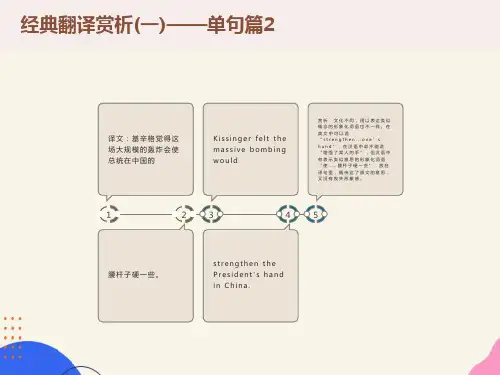
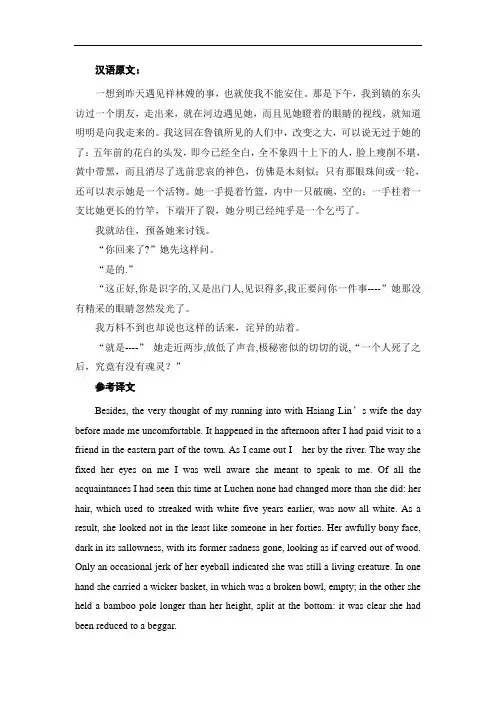
汉语原文:一想到昨天遇见祥林嫂的事,也就使我不能安住。
那是下午,我到镇的东头访过一个朋友,走出来,就在河边遇见她,而且见她瞪着的眼睛的视线,就知道明明是向我走来的。
我这回在鲁镇所见的人们中,改变之大,可以说无过于她的了:五年前的花白的头发,即今已经全白,全不象四十上下的人,脸上瘦削不堪,黄中带黑,而且消尽了选前悲哀的神色,仿佛是木刻似;只有那眼珠间或一轮,还可以表示她是一个活物。
她一手提着竹篮,内中一只破碗,空的;一手柱着一支比她更长的竹竿,下端开了裂,她分明已经纯乎是一个乞丐了。
我就站住,预备她来讨钱。
“你回来了?”她先这样问。
“是的.”“这正好,你是识字的,又是出门人,见识得多,我正要问你一件事----”她那没有精采的眼睛忽然发光了。
我万料不到也却说也这样的话来,诧异的站着。
“就是----”她走近两步,放低了声音,极秘密似的切切的说,“一个人死了之后,究竟有没有魂灵?”参考译文Besides, the very thought of my running into with Hsiang Lin’s wife the day before made me uncomfortable. It happened in the afternoon after I had paid visit to a friend in the eastern part of the town. As I came out I her by the river. The way she fixed her eyes on me I was well aware she meant to speak to me. Of all the acquaintances I had seen this time at Luchen none had changed more than she did: her hair, which used to streaked with white five years earlier, was now all white. As a result, she looked not in the least like someone in her forties. Her awfully bony face, dark in its sallowness, with its former sadness gone, looking as if carved out of wood. Only an occasional jerk of her eyeball indicated she was still a living creature. In one hand she carried a wicker basket, in which was a broken bowl, empty; in the other she held a bamboo pole longer than her height, split at the bottom: it was clear she had been reduced to a beggar.I stood still, waiting for her to approach me and beg for money.“you have come back?”she asked me first.“yes.”“that is good. You are a scholar, and have traveled too and have seen much of the world. I just want to ask you something.”Her lusterless/blank/dull eyes suddenly lit up.I never expected she would talk to me in this way. So I stood there in bewilderment.“My question is.”She drew/took two paces nearer, and whispered very confidentially: “After a person dies, will he turn into a ghost or not?”汉语原文:故院原为紫禁城,已有550年历史。
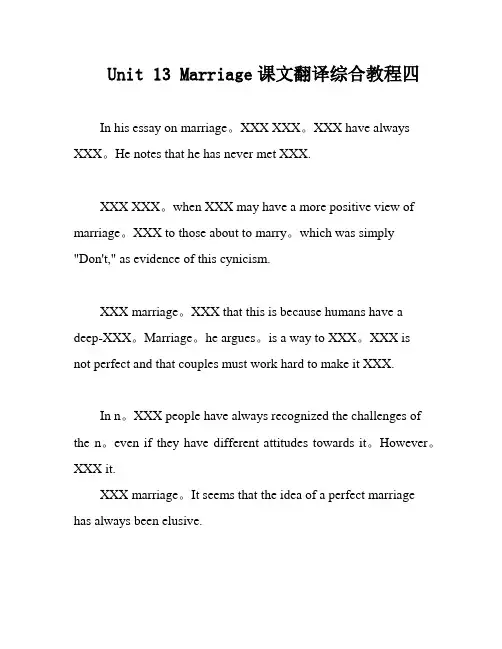
Unit 13 Marriage课文翻译综合教程四In his essay on marriage。
XXX XXX。
XXX have always XXX。
He notes that he has never met XXX.XXX XXX。
when XXX may have a more positive view of marriage。
XXX to those about to marry。
which was simply "Don't," as evidence of this cynicism.XXX marriage。
XXX that this is because humans have a deep-XXX。
Marriage。
he argues。
is a way to XXX。
XXX isnot perfect and that couples must work hard to make it XXX.In n。
XXX people have always recognized the challenges of the n。
even if they have different attitudes towards it。
However。
XXX it.XXX marriage。
It seems that the idea of a perfect marriage has always been elusive.As for my own experience。
I can say that I have gone from one difficult XXX。
sung by minstrels。
which mocked the idea of marriage and warned of its difficulties。
While it is possible that these performers exaggerated。
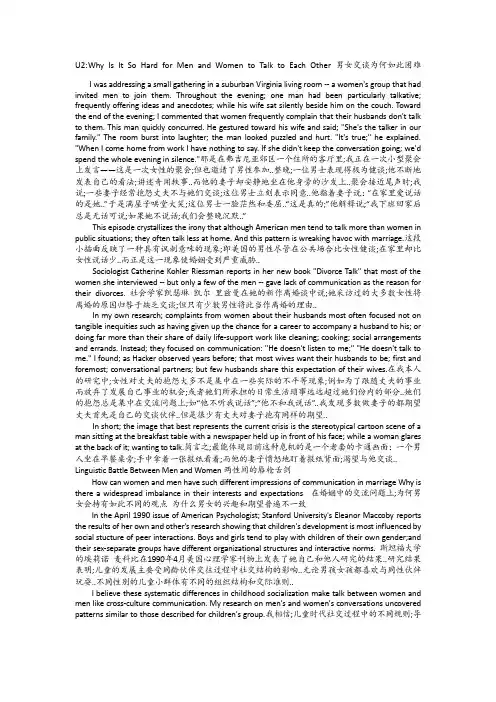
U2:Why Is It So Hard for Men and Women to Talk to Each Other 男女交谈为何如此困难I was addressing a small gathering in a suburban Virginia living room -- a women's group that had invited men to join them. Throughout the evening; one man had been particularly talkative; frequently offering ideas and anecdotes; while his wife sat silently beside him on the couch. Toward the end of the evening; I commented that women frequently complain that their husbands don't talk to them. This man quickly concurred. He gestured toward his wife and said; "She's the talker in our family." The room burst into laughter; the man looked puzzled and hurt. "It's true;" he explained. "When I come home from work I have nothing to say. If she didn't keep the conversation going; we'd spend the whole evening in silence."那是在弗吉尼亚郊区一个住所的客厅里;我正在一次小型聚会上发言——这是一次女性的聚会;但也邀请了男性参加..整晚;一位男士表现得极为健谈;他不断地发表自己的看法;讲述奇闻轶事..而他的妻子却安静地坐在他身旁的沙发上..聚会接近尾声时;我说;一些妻子经常抱怨丈夫不与她们交谈;这位男士立刻表示同意..他指着妻子说:“在家里爱说话的是她..”于是满屋子哄堂大笑;这位男士一脸茫然和委屈..“这是真的;”他解释说;“我下班回家后总是无话可说;如果她不说话;我们会整晚沉默..”This episode crystallizes the irony that although American men tend to talk more than women in public situations; they often talk less at home. And this pattern is wreaking havoc with marriage.这段小插曲反映了一种具有讽刺意味的现象;即美国的男性尽管在公共场合比女性健谈;在家里却比女性说话少..而正是这一现象使婚姻受到严重威胁..Sociologist Catherine Kohler Riessman reports in her new book "Divorce Talk" that most of the women she interviewed -- but only a few of the men -- gave lack of communication as the reason for their divorces. 社会学家凯瑟琳凯尔里兹曼在她的新作离婚谈中说;她采访过的大多数女性将离婚的原因归咎于缺乏交谈;但只有少数男性将此当作离婚的理由..In my own research; complaints from women about their husbands most often focused not on tangible inequities such as having given up the chance for a career to accompany a husband to his; or doing far more than their share of daily life-support work like cleaning; cooking; social arrangements and errands. Instead; they focused on communication: "He doesn't listen to me;" "He doesn't talk to me." I found; as Hacker observed years before; that most wives want their husbands to be; first and foremost; conversational partners; but few husbands share this expectation of their wives.在我本人的研究中;女性对丈夫的抱怨大多不是集中在一些实际的不平等现象;例如为了跟随丈夫的事业而放弃了发展自己事业的机会;或者她们所承担的日常生活琐事远远超过她们份内的部分..她们的抱怨总是集中在交流问题上;如“他不听我说话”;“他不和我说话”..我发现多数做妻子的都期望丈夫首先是自己的交谈伙伴..但是很少有丈夫对妻子抱有同样的期望..In short; the image that best represents the current crisis is the stereotypical cartoon scene of a man sitting at the breakfast table with a newspaper held up in front of his face; while a woman glares at the back of it; wanting to talk.简言之;最能体现目前这种危机的是一个老套的卡通画面:一个男人坐在早餐桌旁;手中拿着一张报纸看着;而他的妻子愤怒地盯着报纸背面;渴望与他交谈.. Linguistic Battle Between Men and Women两性间的唇枪舌剑How can women and men have such different impressions of communication in marriage Why is there a widespread imbalance in their interests and expectations 在婚姻中的交流问题上;为何男女会持有如此不同的观点为什么男女的兴趣和期望普遍不一致In the April 1990 issue of American Psychologist; Stanford University's Eleanor Maccoby reports the results of her own and other's research showing that children's development is most influenced by social stucture of peer interactions. Boys and girls tend to play with children of their own gender;and their sex-separate groups have different organizational structures and interactive norms. 斯坦福大学的埃莉诺麦科比在1990年4月美国心理学家刊物上发表了她自己和他人研究的结果..研究结果表明;儿童的发展主要受同龄伙伴交往过程中社交结构的影响..无论男孩女孩都喜欢与同性伙伴玩耍..不同性别的儿童小群体有不同的组织结构和交际准则..I believe these systematic differences in childhood socialization make talk between women and men like cross-culture communication. My research on men's and women's conversations uncovered patterns similar to those described for children's group.我相信;儿童时代社交过程中的不同规则;导致了两性间的交谈如同跨文化交流一样难..我本人通过对男女对话的研究发现;成年男女对话的模式类似于儿童群体交流过程中的模式..For women; as for girls; intimacy is the fabric of relationships; and talk is the thread from which it is woven. little girls creat and maintain friendship by exchanging secrets;similarly;women regard conversation as the cornerstoneof friendship. So a woman expects her husband to be a new and improved version of a best friend. What is important is not the individual subjects that are discussed but the sense of closeness;of a life shared;that emerges when people tell their thoughts;feelings;and impressions. 成年女性同女孩一样;彼此亲密是她们感情关系的纽带..而交谈是编织这种纽带的线..小女孩通过相互交换秘密来建立和维持友谊..同样;成年女性也把交谈看作友谊的基础..因此;女性期望丈夫成为自己新的、更好的知心朋友..对她们来说重要的不是某个具体的讨论话题;而是在说出自己的想法、感受和印象时所表现出来的那种亲密的、分享生活的感觉..Bonds between boys can be as intense as girls'; but they are based less on talking; more on doing things together. Since they don't assume talk is the cement that binds a relationship; men don't know what kind of talk women want; and they don't miss it when it isn't there. 男孩间的关系和女孩一样紧密..但男孩间的关系与其说建立在交谈基础上;不如说建立在共同动手基础上..既然他们不认为交谈能够巩固感情关系;他们不知道女人需要何种交谈;也不会因为没有交谈而感到遗憾..Boys' group are larger; more inclusive; and more hierachical; so boys must struggle to avoid the subordinate position in the group. This may play a role in women's complaints that men don't listen to them. 男孩的群体比女孩的要大;所包括的人更广泛; 也更具有等级特色..因此;男孩们势必要努力争取不在群体中处于从属地位..这也许是为什么女人抱怨男人不听她们说话的根源之一..Often when women tell men;"You aren't listening."and men protest "I am";the man are right. The impression of not listening results from misalignments in the mechanics of conversation.This misalignment begins as soon as a man and a woman take physical position. When I studied videotapes made by psychologist Bruce Dorval of children and adults taking to their same-sex best friends;I found at every age;the girls and women faced each other directly;their eyes anchored on each other's face. At every age;the boys and men sat at angles to each other and looked elsewhere in the room;perildically glancing at each other. But the tendency of men to face away can give women the impression they aren't listening even when they are.A young woman in college was frustrated:whenever she told her boyfriend she wanted to talk to him;he would lie down on the floor;close his eyes;and put his arm over his face. This signaled to her;"He's taking a nap."But he insisted he was listening extra hard. Normally;He looks around the room;so he is easily distracted. Lying down and covering his eyes helped him concentrate on what she was saying.当女的对男的说“你没有在听”;而男的反对说“我在听”时;常常男的是对的..这种给人没有在听的印象是由于男女对话方式的不同而引起的..这种不同在男女各自就位时就已表现出来了..我对心理学家布鲁斯多维尔录制的关于儿童与成人分别与他们的同性好友交谈时的录像带进行了研究..研究发现;无论多大年龄的女孩和成年女性;都采取面对面的姿势;眼睛看着对方的脸..而各种年龄的男孩和成年男子就座时;相互位置都成一定的角度;眼睛看着屋子别的地方;只有时不时瞥对方一眼..男性这种看着别处的习惯;可能给女性一种印象;那就是他们没有在听;即使他们在听也会给人以没有在听的印象..一个年轻的女大学生感到很失望;因为每当她告诉男朋友她想跟他谈谈时;他总是躺在地上;闭上眼睛;并用手臂挡住脸..她对此的理解是;“他想睡一会儿”..而他则坚持说他在非常认真地倾听..在一般情况下;他会环顾屋子四周;所以容易分心..而躺在地上;蒙住眼睛会使他专心致志听女友说话..Swiching topics is another habit that gives women the impression men aren't listening especially if they swich to a topic about themselves. The girls in my study tended to talk at length about one topic;but the boys tended to jump from topic to topic. 转移话题是男人的另一种习惯;这种习惯也给女人一个印象:他们没有在听..特别是当他们把话题转移到自己身上时更是如此..在我的研究中;女孩往往就一个话题谈得很详细;而男孩倾向于不断改变话题..My study of the 10th-grade children found that when a girl told a friend about a problem;the friend responded by asking probing questions and expressing agreement and understanding.But the boys dismissed each other's problems. Tldd assured Richard that his drinking was "no big problem".And when Todd said he felt left out;Richard responded;"Why should you You know more people than me." 我对10年级的孩子所进行的研究发现;当女孩对朋友倾诉烦恼时;对方总是刨根问底;并且表示同意和理解..男孩却不把对方的问题看得那么严重..例如;托德安慰理查德说他饮酒“不是什么大问题”..当托德说他遭受冷落时;理查德回答说:“你怎么会这么想你认识的人比我还多..”Women perceived such responses as belittling and unsupportive.But the boys seemed satisfied with them.Whereas women reassure each by implying;"You shouldn't feel bad because I've had similar experiences;"men do so by implying;"You shouldn't feel bad because your problems aren't so bad." 女性把这种回答看作是轻视她们的问题和不支持她们..但男性似乎对这种回答很满意..女性的回答暗示:“你不应该感到难过;因为我也有过类似的经历;”从而彼此安慰..而男性通过暗示“你不应该感到难过;因为你的问题并不那么糟糕”来彼此安慰..There are even simpler reasons for women's impression that men don't listen. Linguist Lynette Hirschman found that women make more listener-noise; such as "mhm";"uhuh";and "yeah";to show "I'm with you". Men; she found; more often give silent attention. Women who expect a stream of listener-noise interpret silent attention as no attention at all.还有更简单的原因来解释为什么女人总觉得男人没有在听..语言学家莱内特赫希曼发现;女性比男性发出更多的倾听者的声音;如“对”;“嗯嗯”;“是”等来表示“我理解”..她发现;男人通常是静静地倾听..而女人期待听到一连串倾听者的声音;她们把静静地听理解为根本没有注意听..Women's conversational habits are as frustrating to men as men's are to women. Men who expect silent attention interpret a stream of listener-noise as overreaction or impatience. Also;when women talk to each other in a close; domfortable setting;they often overlap;finish each other's sentences and anticipate what the other is about to say. This practice;which I call "participatory listenership"; is often perceived by men as interruption;intusion and lack of attention. 男性的对话习惯使女性感到失望;同样;女性的对话习惯也使男性感到失望..男性期望的是静静地注意听;他们将一连串倾听者的声音理解为过头的反应或是不耐烦..此外;当女性在一个亲密、舒适的环境里交谈时;常常互相搭话;说完对方未说完的句子;并且能够预料到对方要说什么..我把这种做法叫做“参与式倾听”;男性往往将此理解为干扰、冒犯和缺乏注意力..A parallel difference caused a man to complain about his wife;"She just wants to talk about her own point of view.If I show her another view;she gets mad at me."When most women talk to each other; they assume a conversationalist's job is to express agreement and support.But many men see their conversational duty as pointing out the other side of an argument. This is heard as disloyalty by women; and refusal to offer the requisite support.It is not that women don't want to see other points of view;but that they prefer them phrased as suggestions and inquiries rather than as direct challenges. 同样;男女之间的差别也使丈夫抱怨妻子;“她只想表达她的观点..如果我向她表达另一种不同的观点;她就对我生气..”多数妇女在交谈时;认为谈话伙伴要做的事就是表示赞同和支持..而很多男人则认为;谈话时指出问题的另一面才是他们的责任..在女性看来;这样做是一种不真诚的表现;是拒绝给予必要的支持..这不是因为女性不想听到别的观点;而是因为女性更喜欢将这些观点以建议或询问的言词表达出来;而不是以直接了当的挑战形式表达出来..The Sounds of Silence沉默的声音These differences begin to clarify why women and men have such different expectations about communication in marriage. For women; talk creates intimacy. Marriage is an orgy of closeness: you can tell your feelings and thoughts; and still be loved. Their greatest fear is being pushed away. But men live in a hierarchical world; where talk maintains independence and status. They are on guard to protect themselves from being put down and push around. 上述这些区别可以解释为什么在婚姻内的交流问题上;男女抱有如此不同的期望..对女性来说;交谈可以使关系亲密..婚姻关系是一种无比密切的关系:你可以说出你的感受和想法;对方会依然爱着你..女性最大的恐惧是被排斥..但是;男人生活在一种等级分明的世界里;谈话的目的是保持自己的独立性与地位..他们必须时刻警惕;保护自己;以免受人压制或受人摆布..This explains the paradox of the talkative man who said of his silent wife;"She's the talker." In the public setting; he felt challenged to show his intelligence and display his understanding. But at home; where he has nothing to prove and no one to defend against; he is free to remain silent. For hi wife; being home means she is free from the worry that something she says might offend someone; or spark disagreement; or appear to be showing off; at home she is free to talk. 这一点也解释了那个健谈的男人说他那沉默的妻子“她才能说呢”这种矛盾局面..在公共场合;他觉得迫不得已要表现自己的聪颖、展示自己的理解力..但在家里;他不需要证明什么;也不需要提防任何人;所以他不想说话就不说话..对他的妻子来说;在家意味着不必担心自己说的话会得罪别人;或者引发矛盾;或者显得炫耀自己..在家里;她可以想说什么就说什么..The communication problems that endanger marriage can't be fixed by mechanical engineering. They require a new conceptual framework about the role of talk in human relationships. Many of the psychological explanations may not be helpful; because they tend to blame either womenfor not being assertive enough or menfor not being in touch with their feelings. A sociolinguistic approach by which male-female conversation is seen as cross-cultural communication allows us to understand the problem and forge solutions without blaming either party. 交流问题威胁着婚姻;但不能通过机械的手段来修补..这些问题要求我们用一种新观念来看待谈话在人际关系中所起的作用..从心理学的角度所作的许多解释都无济于事;因为这些解释往往责怪女性不够自信;或者责怪男性不关心她们的感情..如果从社会语言学的角度;将男女对话看作跨文化交流;我们便会理解这个问题;找到问题的答案;而又不责怪任何一方..Once the problem is understood; improvement comes naturally. Women who feel abandoned and deprived when their husbands won't listen to or report daily news may be happy to discover their husbands trying to adapt once they understand the place of small talk in women's relationships. But if their husbands don't adapt; the women may still be comforted that for men; this is not a failure of intimacy. Accepting the difference; the wives may look to their friends or family for that kind of talk. And husbands who can't provide it shouldn't feel their wives have made unreasonable demands. Some couples will still decide to divorce; but an least their decisions will be based on realistic expectations. 一旦问题得到理解;情况自然有所改善..那些通常因丈夫不倾听或不谈论每天发生的事情而感到被遗弃、感到丧失生活乐趣的女性会高兴地发现;她们的丈夫一旦知道了不起眼的谈话在女性关系中的地位后;正努力地在适应..如果丈夫不适应;妻子仍然能够得到安慰;因为她知道;对男人来说;这不是不亲密的表现..当妻子接受了男女存在区别这一事实后;便会去找自己的朋友或家人说一说话..那些不能够给予妻子谈话快乐的丈夫;也不应该觉得妻子提出了无理要求..仍然会有一些夫妻决定离婚;但起码他们的决定是建立在比较现实的期望基础上的..。
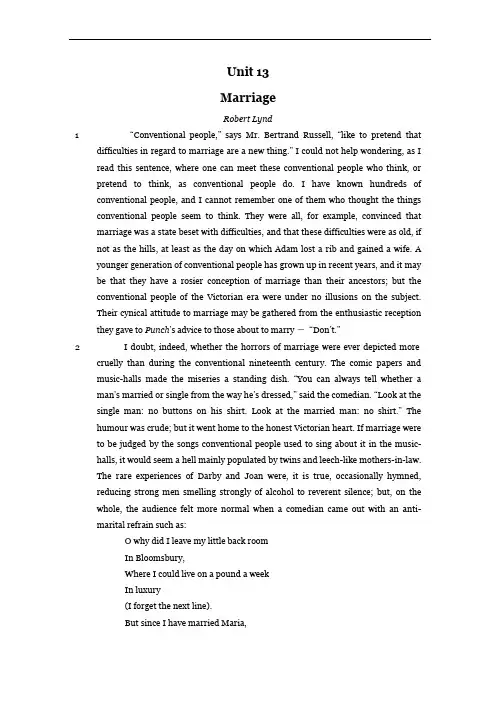
Unit 13MarriageRobert Lynd1“Conventional people,” says Mr. Bertrand Russell, “like to pretend that difficulties in regard to marriage are a new thing.” I could not help wondering, as I read this sentence, where one can meet these conventional people who think, or pretend to think, as conventional people do. I have known hundreds of conventional people, and I cannot remember one of them who thought the things conventional people seem to think. They were all, for example, convinced that marriage was a state beset with difficulties, and that these difficulties were as old, if not as the hills, at least as the day on which Adam lost a rib and gained a wife. A younger generation of conventional people has grown up in recent years, and it may be that they have a rosier conception of marriage than their ancestors; but the conventional people of the Victorian era were under no illusions on the subject.Their cynical attitude to marriage may be gathered from the enthusiastic reception they gave to Punch’s advice to those about to marry -“Don’t.”2I doubt, indeed, whether the horrors of marriage were ever depicted more cruelly than during the conventional nineteenth century. The comic papers and music-halls made the miseries a standing dish. “You can always tell whether a man’s married or single from the way he’s dressed,” said the comedian. “Look at the single man: no buttons on his shirt. Look at the married man: no shirt.” The humour was crude; but it went home to the honest Victorian heart. If marriage were to be judged by the songs conventional people used to sing about it in the music- halls, it would seem a hell mainly populated by twins and leech-like mothers-in-law.The rare experiences of Darby and Joan were, it is true, occasionally hymned, reducing strong men smelling strongly of alcohol to reverent silence; but, on the whole, the audience felt more normal when a comedian came out with an anti- marital refrain such as:O why did I leave my little back roomIn Bloomsbury,Where I could live on a pound a weekIn luxury(I forget the next line).But since I have married Maria,I’ve jumped out of the frying-panInto the blooming fire.3No difficulties? Why, the very nigger-minstrels of my boyhood used to open their performance with a chorus which began:Married! Married! O pity those who’re married.Those who go and take a wife must be very green.4It is possible that the comedians exaggerated, and that Victorian wives were not all viragos with pokers, who beat their tipsy husbands for staying out too late. But at least they and their audiences refrained from painting marriage as an inevitable Paradise. Even the clergy would go no farther than to say that marriages were made in Heaven. That they did not believe that marriage necessarily ended there is shown by the fact that one of them wrote a “best-seller” bearing the title How to Be Happy Though Married.5I doubt, indeed, whether common opinion in any age has ever looked on marriage as an untroubled Paradise. I consulted a dictionary of quotations on the subject and discovered that few of the opinions quoted were rose-coloured. These opinions, it may be objected, are the opinions of unconventional people, but it is also true that they are opinions treasured and kept alive by conventional people. We have the reputed saying of the henpecked Socrates, for example, when asked whether it was better to marry or no t: “Whichever you do, you will repent.” We have Montaigne writing: “It happens as one sees in cages. The birds outside despair of ever getting in; those inside are equally desirous of getting out.” Bacon is no more prenuptial with his caustic quotation: “H e was reputed one of the wise men that made answer to the question when a man should marry: ‘A young man not yet; an elder man not at all.’” Burton is far from encouraging! “One was never married, and that’s his hell; another is, and that’s his plague.” Pe pys scribbled in his diary: “Strange to say what delight we married people have to see these poor folk decoyed into our condition.”6The pious Jeremy Taylor was as keenly aware that marriage is not all bliss.“Marriage,” he declared, “hath in it less of be auty and more of safety than the single life -it hath more care but less danger; it is more merry and more sad; it is fuller of sorrows and fuller of joys.” The sentimental and optimistic Steele can do no better than: “The marriage state, with and without the affection suitable to it, is the completest image of Heaven and Hell we are capable of receiving in this life.”7Rousseau denied that a perfect marriage had ever been known. “I have oftenthought,” he wrote, “that if only one could prolong the joy of love in marriage we should have paradise on earth. That is a thing which has never been hitherto.” Dr.Johnson is not quoted in the dictionary; but everyone will remember how, devoted husband though he was, he denied that the state of marriage was natural to man.“Sir,” he declared, “it is so far from being natural for a man and woman to live in a state of marriage that we find all the motives which they have for remaining in that connexion and the restraints which civilised society imposes to prevent separation are hardly sufficient to keep them together."8When one reads the things that have been said about marriage from one generation to another, one cannot but be amazed at the courage with which the young go on marrying. Almost everybody, conventional and unconventional, seems to have painted the troubles of marriage in the darkest colours. So pessimistic were the conventional novelists of the nineteenth century about marriage that they seldom dared to prolong their stories beyond the wedding bells. Married people in plays and novels are seldom enviable, and, as time goes on, they seem to get more and more miserable. Even conventional people nowadays enjoy the story of a thoroughly unhappy marriage. It is only fair to say, however, that in modern times we like to imagine that nearly everybody, single as well as married, is unhappy. As social reformers we are all for happiness, but as thinkers and aesthetes we are on the side of misery.9The truth is that we are a difficulty-conscious generation. Whether or not we make life even more difficult than it would otherwise be by constantly talking about our difficulties I do not know. I sometimes suspect that half our difficulties are imaginary and that if we kept quiet about them they would disappear. Is it quite certain that the ostrich by burying his head in the sand never escapes his pursuers?I look forward to the day when a great naturalist will discover that it is to thispractice that the ostrich owes his survival.婚姻罗伯特·林德1伯特兰·罗素先生说:“凡人百姓喜欢假装说婚姻中遇到的困难是新鲜事。
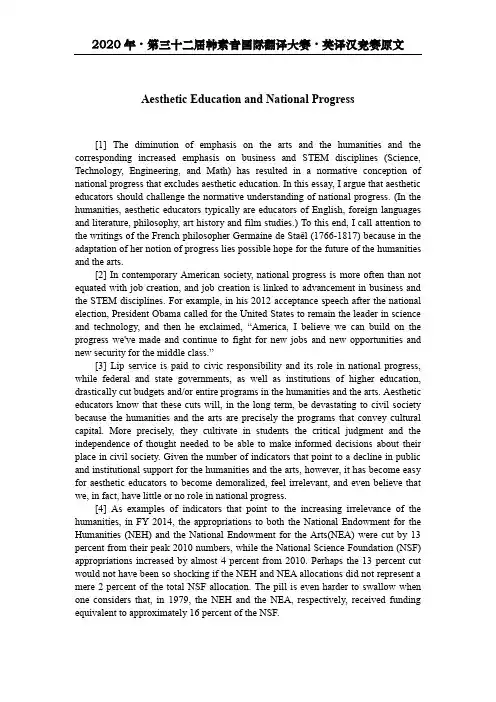
Aesthetic Education and National Progress[1] The diminution of emphasis on the arts and the humanities and the corresponding increased emphasis on business and STEM disciplines (Science, Technology, Engineering, and Math) has resulted in a normative conception of national progress that excludes aesthetic education. In this essay, I argue that aesthetic educators should challenge the normative understanding of national progress. (In the humanities, aesthetic educators typically are educators of English, foreign languages and literature, philosophy, art history and film studies.) To this end, I call attention to the writings of the French philosopher Germaine de Staël (1766-1817) because in the adaptation of her notion of progress lies possible hope for the future of the humanities and the arts.[2] In contemporary American society, national progress is more often than not equated with job creation, and job creation is linked to advancement in business and the STEM disciplines. For example, in his 2012 acceptance speech after the national election, President Obama called for the United States to remain the leader in science and technology, and then he exclaimed, “America, I believe we can build on the progress we've made and continue to fight for new jobs and new opportunities and new security for the middle class.”[3] Lip service is paid to civic responsibility and its role in national progress, while federal and state governments, as well as institutions of higher education, drastically cut budgets and/or entire programs in the humanities and the arts. Aesthetic educators know that these cuts will, in the long term, be devastating to civil society because the humanities and the arts are precisely the programs that convey cultural capital. More precisely, they cultivate in students the critical judgment and the independence of thought needed to be able to make informed decisions about their place in civil society. Given the number of indicators that point to a decline in public and institutional support for the humanities and the arts, however, it has become easy for aesthetic educators to become demoralized, feel irrelevant, and even believe that we, in fact, have little or no role in national progress.[4] As examples of indicators that point to the increasing irrelevance of the humanities, in FY 2014, the appropriations to both the National Endowment for the Humanities (NEH) and the National Endowment for the Arts(NEA) were cut by 13 percent from their peak 2010 numbers, while the National Science Foundation (NSF) appropriations increased by almost 4 percent from 2010. Perhaps the 13 percent cut would not have been so shocking if the NEH and NEA allocations did not represent a mere 2 percent of the total NSF allocation. The pill is even harder to swallow when one considers that, in 1979, the NEH and the NEA, respectively, received funding equivalent to approximately 16 percent of the NSF.[5] Salaries represent a second measure of the diminishing consideration for the humanities and the arts within university structures. The Oklahoma Faculty Survey by Discipline, a study that surveys the salaries of professors at 114 “Research University/Very High Research Activity”institutions, lists average salaries for all ranks of tenure-track faculty in a number of disciplines. According to the 2013-14 study, the average salary of a faculty member in the arts was $71,463; in English, $76,627; in philosophy and religious studies, $81,971; in physical sciences, $102,636; in engineering, $114,827; and in business management, $139,093. While salaries in 2013-14 increased from 2011-12 in the physical science, engineering, and business management, they decreased in the fine arts, English, and philosophy. If markets drive salaries, the arts and the humanities are clearly not high in market demand. This lack of demand for the humanities and the arts is further underscored in Governor Rick Scott's proposal that tuition rates for Florida state universities be frozen for students who major in “strategic areas”. Lizette Alvarez from the New York Times states of Scott’s proposal, “The message from Tallahassee could not be blunter: Give us engineers, scientists, health care specialists and technology experts. Do not worry so much about historians, philosophers, anthropologists and English majors.”From multiple perspectives, then, we see an explicit shift to STEM disciplines and a discouragement of humanities and arts education, whether in program development, faculty salaries, or student tuitions. Faced with what seems to be such overwhelming confirmation of aesthetic educators’ irrelevance to today’s understanding of national progress—namely, advancement in business, science and technology—aesthetic educators in the humanities and the arts are struggling to communicate to others outside our field, and to the public at large, our vital role.[6] As demoralizing as the perceived irrelevance of arts and humanities education may be and as disappointing as our attempts to articulate our relevance have been, we may be able to begin to find hope and purpose in renewed debate around how we think about “progress”and, more precisely, the role of aesthetic education in “progress”. The writings of Germaine de Staël are particularly illuminating because they situate aesthetic education squarely in the progress of the nation and have bearing on the dilemma facing the humanities and the arts today. Her prescient philosophy turns the definition of progress on its head and could give aesthetic educators a powerful tool to fight for the increased relevance and vitality of the humanities and the arts in the broader notion of progress.[7] Germaine de Staël’s notion of progress—namely, the alignment of the perfectibility of the human mind (accretion of knowledge) with the perfectibility of the human species (interplay between individual morality and public morality) —has direct bearing on the difficulties that we as aesthetic educators are having today in articulating our essential role in national progress. Obviously, both types of progress (perfectibility of the human mind and perfectibility of the human species) are essential to the progress of the nation, but Germaine de Staël argues convincingly that they must align. Aesthetic educators might thus remind the public that business and the STEM disciplines neither have as their mandate the watchful alignment of individual and public morality (the vector that guarantees freedom and the continual perfectingof the nation) nor do they have as their directive resistance against dogma. Furthermore, investment in STEM at the expense of the arts and the humanities parallels the Enlightenment’s obsession with progress as defined as the conservation and accretion of empirical knowledge and material gain. This obsession, at least in Germaine de Staël’s view, contributed to the neglect of the interior moral life of the individual. It, furthermore, diminished emphasis on moral responsibility and independence of judgment, which consequently led to increased partisanship, culminating in the fanaticism of the Reign of Terror. While it is hard to imagine the advent of a Reign of Terror in the United States, it can be argued that obsession with unbridled advancement in science and business at the expense of aesthetic education could lead to the weakening of individual morality—defined by Staël as the devotion to freedom, human rights, and the possibility of collective happiness for all.[8] If Germaine de Staël were alive today, she might argue that the solution to our current humanities and arts crisis is a relatively simple one. First, argue for national progress to be understood as the alignment of the perfectibility of the human mind with the perfectibility of the human species. Scientific advancement at the expense of the watchful alignment of individual and public morality poses a threat to the stability of our nation. Consequently, any call for national progress must include sufficient support of and funding for precisely the disciplines (the humanities and the arts) that have this alignment as their mandate. Secondly, encourage educational models that allow for the combination of a “useful”subject that contributes to a knowledge-based economy and a subject in which they will receive an aesthetic education.。
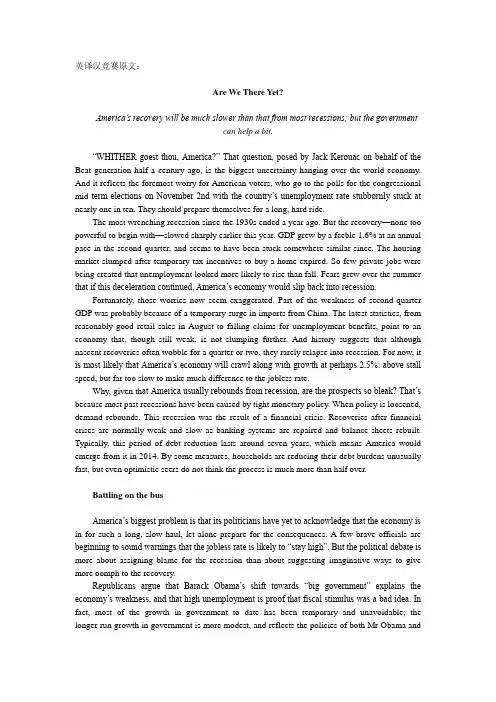
英译汉竞赛原文:Are We There Yet?America’s recovery will be much slower than that from most recessions; but the governmentcan help a bit.“WHITHER goest thou, America?” That question, posed by Jack Kerouac on behalf of the Beat generation half a century ago, is the biggest uncertainty hanging over the world economy. And it reflects the foremost worry for American voters, who go to the polls for the congressional mid-term elections on November 2nd with the country’s unemployment rate stubbornly stuck at nearly one in ten. They should prepare themselves for a long, hard ride.The most wrenching recession since the 1930s ended a year ago. But the recovery—none too powerful to begin with—slowed sharply earlier this year. GDP grew by a feeble 1.6% at an annual pace in the second quarter, and seems to have been stuck somewhere similar since. The housing market slumped after temporary tax incentives to buy a home expired. So few private jobs were being created that unemployment looked more likely to rise than fall. Fears grew over the summer that if this deceleration continued, America’s economy would slip back into recession.Fortunately, those worries now seem exaggerated. Part of the weakness of second-quarter GDP was probably because of a temporary surge in imports from China. The latest statistics, from reasonably good retail sales in August to falling claims for unemployment benefits, point to an economy that, though still weak, is not slumping further. And history suggests that although nascent recoveries often wobble for a quarter or two, they rarely relapse into recession. For now, it is most likely that America’s economy will crawl along with growth at perhaps 2.5%: above stall speed, but far too slow to make much difference to the jobless rate.Why, given th at America usually rebounds from recession, are the prospects so bleak? That’s because most past recessions have been caused by tight monetary policy. When policy is loosened, demand rebounds. This recession was the result of a financial crisis. Recoveries after financial crises are normally weak and slow as banking systems are repaired and balance-sheets rebuilt. Typically, this period of debt reduction lasts around seven years, which means America would emerge from it in 2014. By some measures, households are reducing their debt burdens unusually fast, but even optimistic seers do not think the process is much more than half over.Battling on the busAmerica’s biggest problem is that its politicians have yet to acknowledge that the economy is in for such a long, slow haul, let alone prepare for the consequences. A few brave officials are beginning to sound warnings that the jobless rate is likely to “stay high”. But the political debate is more about assigning blame for the recession than about suggesting imaginative ways to give more oomph to the recovery.Republicans argue that Barack Obama’s shift towards “big government” explains the economy’s weakness, and that high unemployment is proof that fiscal stimulus was a bad idea. In fact, most of the growth in government to date has been temporary and unavoidable; the longer-run growth in government is more modest, and reflects the policies of both Mr Obama andhis predecessor. And the notion that high joblessness “proves” that stimulus failed is simply wron g. The mechanics of a financial bust suggest that without a fiscal boost the recession would have been much worse.Democrats have their own class-warfare version of the blame game, in which Wall Street’s excesses caused the problem and higher taxes on high-earners are part of the solution. That is why Mr. Obama’s legislative priority before the mid-terms is to ensure that the Bush tax cuts expire at the end of this year for households earning more than $250,000 but are extended for everyone else.This takes an unnecessary risk with the short-term recovery. America’s experience in 1937 and Japan’s in 1997 are powerful evidence that ill-timed tax rises can tip weak economies back into recession. Higher taxes at the top, along with the waning of fiscal stimulus and belt-tightening by the states, will make a weak growth rate weaker still. Less noticed is that Mr. Obama’s fiscal plan will also worsen the medium-term budget mess, by making tax cuts for the middle class permanent.Ways to overhaul the engineIn an ideal world America would commit itself now to the medium-term tax reforms and spending cuts needed to get a grip on the budget, while leaving room to keep fiscal policy loose for the moment. But in febrile, partisan Washington that is a pipe-dream. Today’s goals can only be more modest: to nurture the weak economy, minimize uncertainty and prepare the ground for tomorrow’s fiscal debate. To that end, Congress ought to extend all the Bush tax cuts until 2013. Then they should all expire—prompting a serious fiscal overhaul, at a time when the economy is stronger.A broader set of policies could help to work off the hangover faster. One priority is to encourage more write-downs of mortgage debt. Almost a quarter of all Americans with mortgages owe more than their houses are worth. Until that changes the vicious cycle of rising foreclosures and falling prices will continue. There are plenty of ideas on offer, from changing the bankruptcy law so that judges can restructure mortgage debt to empowering special trustees to write down loans. They all have drawbacks, but a fetid pool of underwater mortgages will, much like Japan’s loans to zombie firms, corrode the financial system and harm the recovery.Cleaning up the housing market would help cut America’s unemploy ment rate, by making it easier for people to move to where jobs are. But more must be done to stop high joblessness becoming entrenched. Payroll-tax cuts and credits to reduce the cost of hiring would help. (The health-care reform, alas, does the opposite, at least for small businesses.) Politicians will also have to think harder about training schemes, because some workers lack the skills that new jobs require.Americans are used to great distances. The sooner they, and their politicians, accept that the road to recovery will be a long one, the faster they will get there.。
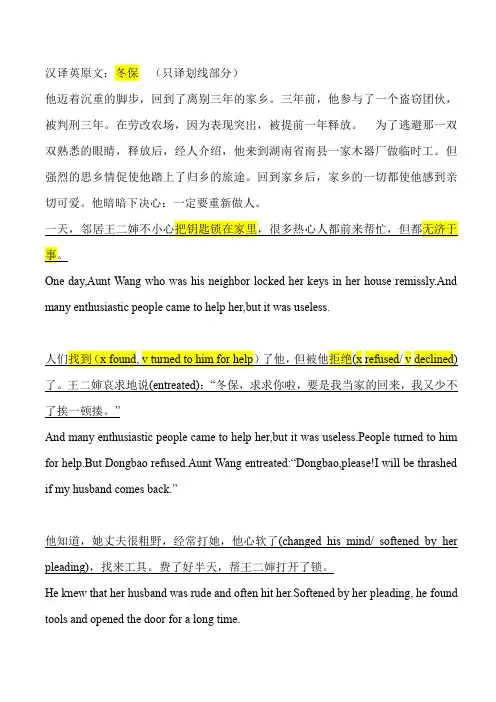
汉译英原文:冬保(只译划线部分)他迈着沉重的脚步,回到了离别三年的家乡。
三年前,他参与了一个盗窃团伙,被判刑三年。
在劳改农场,因为表现突出,被提前一年释放。
为了逃避那一双双熟悉的眼睛,释放后,经人介绍,他来到湖南省南县一家木器厂做临时工。
但强烈的思乡情促使他踏上了归乡的旅途。
回到家乡后,家乡的一切都使他感到亲切可爱。
他暗暗下决心:一定要重新做人。
一天,邻居王二婶不小心把钥匙锁在家里,很多热心人都前来帮忙,但都无济于One day,Aunt Wang who was his neighbor locked her keys in her house remissly.And many enthusiastic people came to help her,but it was useless.人们找到(x found, v turned to him for help)了他,但被他拒绝(xrefused/ vdeclined)了。
王二婶哀求地说(entreated):“冬保,求求你啦,要是我当家的回来,我又少不了挨一顿揍。
”And many enthusiastic people came to help her,but it was useless.People turned to him for help.But Dongbao refused.Aunt Wang entreated:“Dongbao,please!I will be thrashed if my husband comes back.”他知道,她丈夫很粗野,经常打她,他心软了(changed his mind/ softened by her pleading),找来工具。
费了好半天,帮王二婶打开了锁。
He knew that her husband was rude and often hit her.Softened by her pleading, he found tools and opened the door for a long time.王二婶感激万分,特意(to express her gratitude)买来一盒过滤嘴香烟,非要塞给他。
汉英高级笔译参考题随机抽取:第I题4分×5(小题);第II题10分×3(小题);第III题25分×2小题,合计100分将以下各句译成英语/汉语(每题4分)浪漫一身(时装广告。
注意“身”、“声”发音相似)光彩人生,源于光源!(荧光棒广告)小商品,大感受。
(家具配件广告。
要求前者处理为形容词加名词,后者为形容词加介词加名词)放飞梦想, 实现自我!(出国留学服务机构广告。
要求前者译成动宾结构,后者译成动词加副词)人人为我,我为人人!(某著名企业的财富观)人曾是佛,人不能成佛。
女卑为奴,女又可称奴。
(就中文而言,是个拆字游戏。
要求译文反复使用首韵法)7.日本,当以何为本?印度,难求大国之度(文章标题,含文字游戏)8.金日在手中,万事好成功!(口服液广告。
要求译文押韵)9.今天购买,就在今天享用!(商家促销口号。
要求译文押尾韵)10. 它工作,你(指家庭主妇)休息。
(洗衣机广告。
要求用chores和credit;注意动宾搭配)11. 先点击,后点钱!(IT产品,含文字游戏)12. 你不理财,财不理你。
(某财金杂志广告,其中“理”字含双关)13. 我们实行三包:包修、包退、包换!(商家对顾客的承诺。
要求三个关键短语都以R开头)14. “美的”家电:美的(故意用错别字)全面,美的彻底。
(家用电器广告。
要求“全面”、“彻底”都译成相当于汉语“从……到……”的格式)15. “三优”牌家具:优越的质量、优惠的价格、优质的(售后)服务(要求三个关键短语都以U开头)16. 茅台一开,满室生香。
17. 衣食住行,有龙则灵。
(建设银行“龙卡”广告)18. 非常可乐,非常选择。
(饮料广告。
要求译文重复两遍字母F和C)19. 皮张之厚无以复加,利润之薄无以复减。
(皮件制品广告。
必须用thick和thin;允许词形有变通)20. 要想皮肤好,早晚用大宝。
(护肤霜广告)21.正如广大群众所批评的那样,我们现在是“卫星上天,厕所漏水”。
原文:归来归来,胡不归?归去归去,胡不归?昔我往矣,杨柳依依。
今我来思,雨雪霏霏。
行道迟迟,载渴载饥。
我心伤悲,莫知我哀。
翻译:归来啊归来,为何不归来?归去啊归去,为何不归来?往日我离去时,杨柳依依相伴。
如今我归来时,雨雪纷飞满天。
行走道路缓慢,既感口渴又感饥饿。
我心满怀悲伤,却无人知晓我的哀愁。
原文:青青子衿,悠悠我心。
但为君故,沉吟至今。
呦呦鹿鸣,食野之苹。
我有嘉宾,鼓瑟吹笙。
明明如月,何时可掇?忧从中来,不可断绝。
翻译:青青的衣领,悠长的我心。
只为你的缘故,沉思至今。
呦呦的鹿鸣,食着野生的苹草。
我有贵宾到来,弹奏着琴瑟,吹奏着笙管。
那明亮的月亮,何时才能摘取?忧虑从心中涌起,无法断绝。
原文:关关雎鸠,在河之洲。
窈窕淑女,君子好逑。
参差荇菜,左右流之。
窈窕淑女,寤寐求之。
求之不得,寤寐思服。
悠哉悠哉,辗转反侧。
翻译:关关和鸣的雎鸠,栖息在河中的小洲。
那美丽贤淑的女子,是君子所喜爱的人。
参差不齐的荇菜,左右两岸流动。
那美丽贤淑的女子,日夜思念追求。
追求却得不到,日夜思念不已。
忧愁啊忧愁,辗转反侧难以入眠。
原文:昔人已乘黄鹤去,此地空余黄鹤楼。
黄鹤一去不复返,白云千载空悠悠。
晴川历历汉阳树,芳草萋萋鹦鹉洲。
日暮乡关何处是?烟波江上使人愁。
翻译:昔日的仙人已经骑着黄鹤飞去,这里只留下空荡荡的黄鹤楼。
黄鹤一去不再回来,白云千载空自飘荡。
晴朗的江面上,汉阳的树木清晰可见,鹦鹉洲上的芳草繁茂。
日暮时分,家乡的关口在何处?江上的烟波让人心生愁绪。
原文:床前明月光,疑是地上霜。
举头望明月,低头思故乡。
翻译:床前的月光明亮,疑似地上的霜。
抬头仰望那明亮的月亮,低头沉思故乡之情。
采薇 A Homesick Warrior采薇采薇,采呀采呀大巢菜, We gather fern薇亦作止。
巢菜新芽新又绿。
Which springs up here. 曰归曰归,说回家呀说回家, Why not return岁亦莫止。
转眼又到一年末。
Now ends the year?靡室靡家,无室无家谁之过? We left dear ones玁狁之故。
都怪作战与猃狁。
To fight the Huns.不遑启居,没有闲暇坐下来, We wake all night:玁狁之故。
还是作战与猃狁。
The Huns cause fright.采薇采薇,采呀采呀大巢菜, We gather fern薇亦柔止。
巢菜叶儿肥又嫩。
So tender here.曰归曰归,说回家呀说回家, Why not return?心亦忧止。
我的心里多忧愁。
My heart feels drear. 忧心烈烈,忧心如焚烈烈烧, Hard pressed by thirst 载饥载渴。
出征路上饥又渴。
And hunger worst,我戍未定,驻扎的地方没有定, My heart is burning靡使归聘。
谁能替我传家信? For home, I’m yearning.Far from home, how tosend word now?采薇采薇,采呀采呀大巢菜, We gather fern薇亦刚止。
巢菜叶儿老且硬。
Which grows tough here.曰归曰归,说回家呀说回家, Why not return?岁亦阳止。
转眼又到十月间。
The tenth month’s near. 王事靡盬,王室的事情办不完, The war not won,不遑启处。
哪有片刻能安闲。
We cannot rest.忧心孔疚,忧愁的心情很痛苦, Consoled by none,我行不来!如今有谁来安慰。
We feel distressed.彼尔维何?什么花儿最繁盛? How gorgeous are维常之华。
2010年第22届韩素音青年翻译大赛–汉译英,实验版译文这是初步译文。
完成后,与李长栓老师讨论并修改。
翻译完全是出于兴趣,不是为提供范本。
可取的地方应该不多,错误的地方一定不少。
...周蕴仪译文:Snail Shells, Inner SanctumTranslated by Chow Wan Ee,Edited by Li ChangshuanConventional credence considers an idyllic secluded life sublime bliss; but detachment and removal from social intercourse is a lonely enterprise. As few actually live completely withdrawn from society, gratification of a mere handful is no faithful measure of general wellness.The old saying “A lesser recluse lives in nature; a great recluse dwells amid bustle” is telling. True bliss is not consecrated to hideaways and found not amid dense groves, but exists in a city’s alleys and streets; in an inner sanctum.When rays of dawn slip through rustic carved windows along an alleyway, casting a slow and stately champagne splendour on immaculately pruned bonsais set in courtyards as fried eggs sizzle forth, the morning air begins to crackle with innocent chirrups of little children, rhythmic revving rumble of car engines starting, affectionate goodbyes between man and wife, and no-frills neighbourly greetings. Busy, but not messy; lively, but not rowdy; mundane, but not vexing.The green parcel at the end of the alley has not the plush verdure of nature’s wild; but suffused in the surrounding air is a whiff of life absent in the country. Under the faint amber gleam of every street lamp is a bench that narrates a different story: of sweetness and joy, of sorrow and delight; stories that would mingle and melt into one blend and brewed amid the still of the night.No one knows what pleasant surprise is waiting at the next turn of corner. An unusual and always-crowded eatery? A pub that lives and breathes jazz music?A little coffee joint with wooden bar stools and an atmosphere of languorous leisure? Perhaps sitting outdoors on a timber chair under a parasol chatting with new-found friends over a cup of tea is pleasure.Things, when shaped and sedimented by time, conciliate into habits, intuitive knowing, and culture.When neighbours and friends who come by banter about petty matters and all with the same cunning wit, their squinting eyes would sparkle with wicked glints of intuitive knowing; at the dinner table, family members mouths muzzled with food cackling indistinguishable utterances may be a little loud, but no one takes offence.Alleys may be narrow, but narrowness cannot stall the spread of happiness; yet, as cold concrete jungles emerge, bliss is slowly devoured and taken apart by traffic congestion and polluted air. Homes are bigger and privacy better; and Self is now confined to a solitary enclosure, carefully avoiding infringing the inner world of another, and jealously guarding its own. But during quiet moments of solitude, the once deplored clamour would be dearly missed and fondly reminisced.Compared to Manhattan high-rises, people prefer the sun-basked ancient streets traversing under the massive red dome of the Duomo of Florence; compared to the nightly resplendence of Lujiazui, people prefer the romp and stomp of children’s play at Wanhangdu Road. As our years wither away, dreams would return to find the sombre calm of old houses, the soft choruses of street vendors, and that little alley that had dowered endearing recollections.Discernment would reveal, in every corner inhabited by wisps of moss and vines of ivy, genuine poetry and prose that are neither graceful nor spirited, but that offer mundane bliss. Simple and easy bliss.What is bliss? This may not be a difficult question after all. Bliss is an open book of poetry about common alleys sauntering under city skies.As urban homes glitter and shimmer under the moon-lit expanse, one wonders how much mundane bliss lies within those “snail shells”, that inner sanctum…原文:蜗居在巷陌的寻常幸福隐逸的生活似乎在传统意识中一直被认为是幸福的至高境界。
Unit 1 Changing Lives1Translate the following English sentences into Chinese.1)她把他解雇时,假装很难过。
2)你以为我是好欺骗的吗?3)我小时候梦寐以求想得到答案的问题,终于得到了充分的回答。
4)战争和苦难是同时并存的。
5)要说他只有25岁,我才不信呢。
2Translate the following Chinese sentences into English.1)Mary was born with a silver spoon in her mouth.2)I’m having a devil of a job fixing my car.3)The politician needs the common touch.4)Cast pearls before swine.5)Maybe Kino has cut off his own head and destroyed himself.Unit 2 Crossing Cultures1.Translate the following English sentences into Chinese.1)我们来修订安全规则和卫生规则吧。
2)他成为一个石油大王--- 一个白手起家的石油大王。
3)无知(不仅)是羡慕的根源,也是畏惧的根源。
4)谁开车闯红灯谁就要被罚款。
5)所有这些安排都只是这次舞会的序曲,舞会才是女主人的最终目的。
2.Translate the following Chinese sentences into English.1)They began to study and analyze the situation of the enemy.2)I don’t like chocolate icecream, I prefer vanilla.3)A large or high waterfall is the characteristic of scenic spot.4)They would be very reluctant to postpone or cancel the meeting.5) You cannot build a ship, a bridge or a house if you don’t know how to make or read a design.4.2 Practical writingDear Sir/Madam,We happened to find rich information about AB2006 new products from your company’s web page, and we developed great interest in these new wonders of technology.As we are planning to start a training program about web technology, these new products need to be installed in our newly established lab. For this reason we have decided to place groups of these new series with due consideration of the high reputation of your company and the high quality of your products. The first group will be 100 computers. If necessary, we’ll make a larger group next year.Please give us detailed accounts concerning functions of these new products and after-sale service.We look forward to your early reply.Yours sincerely,Tony WanyUnit 3 Will Our Planet Survive?1.Translate the following English sentences into Chinese.1) 这一下不仅震痛了他的手,也震痛了他的肩膀。
嗟乎!人生于世,如浮萍之随波,漂泊无定。
今日虽居异乡,然心向往之,常怀归思。
欲抒胸臆,以述怀归之情。
自古圣贤,皆怀乡之情。
孔子曰:“父母在,不远游,游必有方。
”孟子亦云:“得其所哉,得其所哉!”此皆言归乡之乐,故乡之情也。
吾虽未至老境,然思归之心,亦如饥渴之望雨露,如失群之雁思归巢。
吾生于斯,长于斯,习于斯,而心系于斯。
斯土斯民,吾之根也。
虽身处异乡,然乡音无改,乡情依旧。
每当夜深人静,独坐灯下,耳畔仿佛响起家乡的乡音,眼前似乎浮现出家乡的山水。
于是,归思如泉涌,无法抑制。
昔者,吾少时,随父游历四方,尝游历于名山大川之间。
每至一地,览胜景,访古迹,心旷神怡。
然游子之心,始终不忘故乡。
每至一处,必打听故乡之事,询问亲故之安。
及长,虽居官于外,然心系故园,不忘家国之情。
今吾已年过不惑,事业有成,然归思愈发浓烈。
每至佳节,思亲之情油然而生。
每逢佳节倍思亲,此情此景,令人心碎。
欲归乡省亲,然路途遥远,家书难达。
欲报答父母养育之恩,然力不从心。
吾尝思,人生在世,如白驹过隙,转瞬即逝。
而故乡之情,如长河之水,源源不断。
故乡,是吾生命之源,是吾心灵之归宿。
故乡之情,如春风化雨,滋润心田;如夏夜微风,清凉解暑;如秋月明辉,照亮前程;如冬雪皑皑,温暖心房。
欲归故乡,须俟良时。
然归心似箭,恨不能立刻回到那熟悉的故乡。
故乡之亲,如待哺之雏,望眼欲穿。
吾欲以寸草之心,报三春晖之恩。
愿以吾之微薄之力,为故乡添砖加瓦,为亲故献上绵薄之礼。
归思如梦,梦回故乡。
故乡之景,历历在目。
青山绿水,鸟语花香,皆令人心旷神怡。
故乡之人,淳朴善良,皆令人感动不已。
愿归乡之日,能重拾儿时之欢乐,共度天伦之乐。
嗟乎!归思如潮,望乡之情,如长夜之明灯,照亮吾前行之路。
愿吾之归思,如春风化雨,滋润故乡之土地;如夏夜微风,拂去亲故之忧愁;如秋月明辉,照亮故乡之前程;如冬雪皑皑,温暖故乡之心房。
归乡之愿,如烛照夜,如灯照路。
愿吾之心,如箭在弦,一触即发。
回家,第13届韩素音翻译大赛参考译文∣文学翻译
今天“高斋翻硕”给大家分享第13届韩素音国际翻译比赛英译汉原文和官方参考译文节选。
原文
I am home for my daughter’s first birthday. By “home” I do not mean the house in Los Angeles where my husband and I and the baby live, but the place where my family is, in the Central Valley of California. It is a vital although troublesome distinction. My husband likes my family but is uneasy in their house, because once there I fall into their ways, which are difficult, oblique, deliberately inarticulate, not my husband’s ways. We live in dusty houses (“D-U-S-T,” he once wrote with his finger on surfaces all over the house, but no one noticed it) filled with mementos quite without value to him (what could the Canton dessert plates. mean to him?
官方参考译文
我回家给女儿过周岁生日。
我所说的“家”,并非指丈夫,我和小宝宝在洛杉矶的家,而是指位于加州中央谷地的娘家。
这样区分,尽管麻烦,却很重要。
丈夫不是不喜欢我娘家的人,但是在我娘家却颇不自在。
因为我一回去,就染上了娘家人的习惯,说起话来故意吞吞吐吐、拐弯抹角、令人费解,完全有别于丈夫的习惯。
我们住在灰蒙蒙的屋子里(丈夫曾用手指在落满灰尘的地方都写上了“灰——尘”
两个大字,只是没人注意),里面还摆满了纪念品,可在丈夫眼里这些东西毫无价值(粤式细瓷点心盘对他来说能有什么意义?
单词解析
第一、二句:I am home for my daughter’s first birthday. By “home” I do not mean the house in Los Angeles where my husband and I and the baby live, but the place where my family is, in the Central Valley of California.
我回家给女儿过周岁生日。
我所说的“家”,并非指丈夫,我和小宝宝在洛杉矶的家,而是指位于加州中央谷地的娘家。
1. Los Angeles [lɔ:s ˈeɪndʒəlz] 洛杉矶。
2. the Central Valley of California 加州中央谷地。
第三句:It is a vital although troublesome distinction.
这样区分,尽管麻烦,却很重要。
1. Vital [ˈvaɪtl] 必不可少的;对…极重要的;维持生命所必需的;生气勃勃的,原文取义“重要的”。
2. troublesome [ˈtrʌblsəm] 令人烦恼的;讨厌的;令人痛苦的;麻烦的,原文取义“麻烦的”。
如华尔街日报例句:
One of the most troublesome things about bubbles is identifying them while they are still inflating, or even when they are about to pop.
关于泡沫,最麻烦的事情之一就是在泡沫还在膨胀、甚至即将破裂的时候将它甄别出来。
3. Distinction [dɪˈstɪŋkʃn] 差别;区别;区分;对比;优秀;不同凡响,原文取义“区分”。
如经济学人例句:
He made a distinction between the "dumb war" in Iraq and the good one in Afghanistan.
他把“愚蠢的伊拉克战争”和正义的阿富汗战争做了明确的区分。
第四句:My husband likes my family but is uneasy in their house, because once there I fall into their ways, which are difficult, oblique, deliberately inarticulate, not my husband’s ways.
丈夫不是不喜欢我娘家的人,但是在我娘家却颇不自在。
因为我一回去,就染上了娘家人的习惯,说起话来故意吞吞吐吐、拐弯抹角、令人费解,完全有别于丈夫的习惯。
1. Uneasy [ʌnˈiːzi]不安的;忐忑;不宁;不自在,如牛津词典例句:
She felt uneasy in the unfamiliar surroundings.
她在陌生的环境中感到局促不安。
2. Oblique [əˈbliːk] 间接的;不直截了当的;拐弯抹角的,如纽约时报例句:
Harvard declined to comment on Saturday about the e-mail searches, but offered what appeared to be an oblique defense.
上周六,哈佛大学拒绝对搜查电子邮件一事置评,不过,学校似乎给出了一个拐弯抹角的辩解。
3. Deliberately [dɪˈlɪbərətli] 故意;不慌不忙地;小心翼翼地;从容不迫地,如经济学人例句:
Uncle was getting very hot. There was no doubt that the Hateman gang were deliberately insulting him.
叔叔非常生气,很明显,Hateman那伙人是在故意侮辱他。
4. inarticulate不善于表达的;不善于说话的;词不达意的;表达得不清楚的,如金融时报例句:
"Going forward" is so infectious that it has spread from inarticulate bankers and analysts to people who once had a fine way with words.
“Goingforward”传染性很强,它已经从不善言辞的银行家和分析师那里,波及到那些一度擅长用词的人们。
第五句:We live in dusty houses (“D-U-S-T,” he once wrote with his finger on surfaces all over the house, but no one noticed it) filled with mementos quite without value to him (what could the Canton dessert plates. mean to him?
我们住在灰蒙蒙的屋子里(丈夫曾用手指在落满灰尘的地方都写
上了“灰——尘”两个大字,只是没人注意),里面还摆满了纪念品,可在丈夫眼里这些东西毫无价值(粤式细瓷点心盘对他来说能有什么意义?
1. Dusty [ˈdʌsti] 布满灰尘的;灰尘覆盖的;土灰色的;灰暗的;无光泽的,原文取义“布满灰尘的”,如经济学人例句:
She was born two months ago on the dusty floor of a mud hut in remote South Sudan, far from medical help.
两个月前,在没有任何医疗救助的情况下,她出生在南部苏丹一个泥巴小屋的满是灰尘的地板上。
2. Memento [məˈmentoʊ] 记忆碎片;备忘录模式;备忘录;纪念;纪念品,原文取义“纪念品”,如金融时报例句:
At the Franklin sale, guests vied for a memento of their favourite hotel.
在弗兰克林酒店拍卖处,客人们争先恐后地购买酒店的纪念品。
3. Canton [ˈkæntən] 广州,广式,粤式,形容词是Cantonese,比如“粤式点心”就可以说Cantonese dim sum。
时间有限,今天就分享这么多啦。